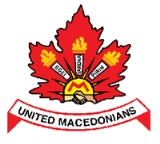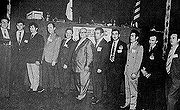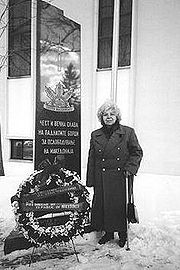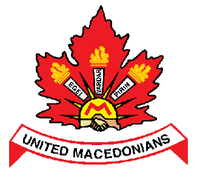
United Macedonians Organization
Encyclopedia
The United Macedonians Organization of Canada is a non-profit
membership organization
founded in 1959 and based in Toronto
, Ontario
, Canada
addressing the interests and needs of the Macedonian community of Canada
. The organization also supports the human rights of the Macedonian minorities in Greece
and Bulgaria
, and promotes the idea of a United
and Free Macedonia.
 By the 1950s Toronto had become the epicenter for organizational activity among post-WWII Macedonians in North America. A total of 20,000-30,000 Aegean Macedonians
By the 1950s Toronto had become the epicenter for organizational activity among post-WWII Macedonians in North America. A total of 20,000-30,000 Aegean Macedonians
, including many of the deca begalci, or child refugees of the Greek civil war
, settled in Toronto. Many among them were spoiling to attack the Greek government for its poor treatment of its Macedonian minority and child refugees. The relatively liberal Canada
of Prime Ministers Lester Pearson and Pierre Trudeau
provided fertile ground in which a left wing emigre organization could grow.
In 1959 a group of eight men met at the Bermuda Tavern on Yonge Street
. The initial eight men became 12 when they met again at Zhelevo Hall, the social space owned by the Zhelevo Benevolence Brotherhood, a mutual aid society founded in 1907 by migrants from Zhelevo (Antartiko) in Aegean Macedonia. Chairing both meetings was James Saunders, a Macedonian-Canadian who had migrated from Zhelevo to Toronto in 1938. On April 28, 1959, the group established itself as the United Macedonians of North America at a gathering at the city’s King Edward Hotel. It started with the Ilinden picnic, an annual gathering of Macedonians on the anniversary of the Ilinden Uprising. The first picnic was held in the summer of 1959 and had brought over 3,000 people together. This manifestation encouraged the committee to make Ilinden an all-Macedonian holiday, which today has become a tradition; drawing ten to fifteen thousand people every year.
The organization undertook many other projects such as publication of periodicals, magazines, newspapers and bulletins explaining the situation in their homeland, and the history of Macedonia. The United Macedonians Committee held many social affairs such as dances, banquets, lectures, and invited many prominent speakers to enlighten Macedonian Canadians about their culture and heritage. In 1962 the committee decided to invite a religious delegation of the Macedonian Orthodox Church
from Skopje
to attend and officiate at the memorial service for the fallen Macedonian heroes of the 1903 Ilinden Uprising. The delegation was headed by His Eminence very Reverend Bishop Naum. The organization also played a significant role in establishing the first Macedonian Orthodox Church in Canada, St. Clement of Ohrid
. In August 1962, members of the United Macedonians Organization held a meeting in the King Edward Hotel in Toronto and the decision was made to build a new church in the Thorncliffe Park
neighbourhood which will bear the name of the medieval Saint Clement of Ohrid. After this decision was brought forth, an assembly was also formed and a church delegation was sent by the Holy Synod in Skopje, Macedonia. The first holy liturgy of the parish was carried out on the 12th of August, 1962 in the Zhelevo Hall. The UMO listed over a hundred members by 1965. Many more non-members routinely attended UMO dances and picnics. The list of members contained a large number of Greek surnames – Papadimitriou, Mangos, Sideris, Loukras – a clear indication of the influence of Aegean Macedonians in the group.
The group’s presence in the United States never achieved the size or momentum it did in Canada, with the possible exception of Detroit. A locus of leftist Macedonian activity since George Pirinski's time, Detroit formed an active United Macedonians chapter in 1970. As in Toronto, much of the UMO's work in Detroit was cultural and educational, and brought together Macedonians from the greater Detroit and Windsor
area for dances, picnics, and banquets
During the early 1990s, at the height of the Greek-Macedonian dispute, the organization was involved in several disputes with members of the Greek community of Toronto over issues regarding protests for Macedonian human rights in Greece, a Macedonian flag raising ceremony at Toronto City Hall
, Macedonian independence parades, and a Macedonian wreath laying ceremony at the bust of Alexander the Great - an historic figure claimed by both communities as their own. Despite strong objection from Toronto's Greek community, Macedonian Canadians were able to successfully carry out these activities throughout the city with permission from city officials. As a result, the then mayor of Toronto, Mel Lastman
, fell victim to an attack from Greek-Torontonians, where he was publicly kicked and spat on for his support to the Macedonian community and alleged anti-Greek actions.

 The United Macedonians Organization continues to fulfill the cultural and political needs of the Macedonian communities in North America. It holds annual cultural events such as the Ilinden Picnic, the Goce Night Banquet - an annual gathering commemorating the birth of the Macedonian revolutionary Goce Delchev, church events, and festivals. In February 2009, the Prime Minister of Canada
The United Macedonians Organization continues to fulfill the cultural and political needs of the Macedonian communities in North America. It holds annual cultural events such as the Ilinden Picnic, the Goce Night Banquet - an annual gathering commemorating the birth of the Macedonian revolutionary Goce Delchev, church events, and festivals. In February 2009, the Prime Minister of Canada
, the Right Honorable Stephen Harper
attended the 50th anniversary celebration of the United Macedonians Organization, where he was welcomed as the guest of honor.
The organization is the owner of "Ilinden Park", a 30 acres (121,405.8 m²) lot in Whitby
, Ontario
. In 1979, UMO built a war memorial
dedicated to Canada's unknown soldier and to all those who lost their lives fighting for the liberty of Macedonia. The memorial is made of granite and is located near St. Clement of Ohrid Macedonian Orthodox Church
in Toronto. The organization is also the publisher of The Macedonian Herald, a Macedonian-Canadian quarterly newspaper.
According to the UMO committee, membership is open to all Macedonians born in ethnic Macedonia, their descendants and spouses who need not be of Macedonian descent, without distinction as to sex, religion or political beliefs, and who agree with the Mission and Goals of the Organization.
1959-1966: James Saunders
1966-1967: John Givens
1967-1968: Georgi Lukras
1968-1969: Jimmie Trentos
1969-1971: Tely Moriovche
1971-1973: Anton Opashinov (Pandov)
1974-1975: James Saunders
1976-1977: Tely Moriovche
1978-1979: Petre Vasilevski
1979-1981: Nikola Stojanovski
1981-1982: Branko Stojcevski
1982-1983: Trajan Tegovski
1983-1984: Dragan Dzolganovski
1984-1987: Mendo Bakalovski
1987-1989: Steve Pliakes
1990-1991: Vlade Grozdanovski
1991-1993: Steve Pliakes
1993-1994: Tely Moriovche
1994-1999: Vlade Grozdanovski
1999-2003: Dragi Stojkovski
2003-2006: Boris Mangov
2006-2009: Dragi Stojkovski
2009–Present: Mendo Bakalovski

Non-profit organization
Nonprofit organization is neither a legal nor technical definition but generally refers to an organization that uses surplus revenues to achieve its goals, rather than distributing them as profit or dividends...
membership organization
Membership organization
A membership organization is a broad term for a group or body which has members. Typically any member of the public can join and a membership fee or "subscription" is payable, but arrangements vary widely...
founded in 1959 and based in Toronto
Toronto
Toronto is the provincial capital of Ontario and the largest city in Canada. It is located in Southern Ontario on the northwestern shore of Lake Ontario. A relatively modern city, Toronto's history dates back to the late-18th century, when its land was first purchased by the British monarchy from...
, Ontario
Ontario
Ontario is a province of Canada, located in east-central Canada. It is Canada's most populous province and second largest in total area. It is home to the nation's most populous city, Toronto, and the nation's capital, Ottawa....
, Canada
Canada
Canada is a North American country consisting of ten provinces and three territories. Located in the northern part of the continent, it extends from the Atlantic Ocean in the east to the Pacific Ocean in the west, and northward into the Arctic Ocean...
addressing the interests and needs of the Macedonian community of Canada
Macedonian Canadians
Macedonian Canadians are a group of ethnic Macedonians who live in Canada.-History:...
. The organization also supports the human rights of the Macedonian minorities in Greece
Greece
Greece , officially the Hellenic Republic , and historically Hellas or the Republic of Greece in English, is a country in southeastern Europe....
and Bulgaria
Bulgaria
Bulgaria , officially the Republic of Bulgaria , is a parliamentary democracy within a unitary constitutional republic in Southeast Europe. The country borders Romania to the north, Serbia and Macedonia to the west, Greece and Turkey to the south, as well as the Black Sea to the east...
, and promotes the idea of a United
United Macedonia
United Macedonia is an irredentist concept among ethnic Macedonian nationalists that aims to unify the transnational region of Macedonia in southeastern Europe, which they claim as their homeland, and which they assert was wrongfully divided under the Treaty of Bucharest in 1913, into a single...
and Free Macedonia.
Organization's mission
The United Macedonians Organization has embarked on the following mission:- To work for the national unity of Macedonians worldwide, regardless of their religious beliefs, political opinions or affiliations;
- To raise the national consciousness and pride of all ethnic Macedonians;
- To work for the attainment of National and Human Rights of all Macedonians, especially those living in the occupied territories of Macedonia;
- To promote good public relations with all peoples and governments who support the national independence and development of Macedonia;
- To work towards a full international acceptance of the Republic of MacedoniaRepublic of MacedoniaMacedonia , officially the Republic of Macedonia , is a country located in the central Balkan peninsula in Southeast Europe. It is one of the successor states of the former Yugoslavia, from which it declared independence in 1991...
under its constitutional name, and for a greater well being for all its citizens; - To work towards easier integration of Macedonians in their countries of residence; and
- To help all Macedonians achieve their utmost in their chosen fields, and thus help society as a whole.
History

Aegean Macedonians
Slavic speakers are a linguistic minority population in the northern Greek region of Macedonia who are mostly concentrated in certain parts of the peripheries of West and Central Macedonia, adjacent to the territory of the Republic of Macedonia. A smaller group exists in East Macedonia adjacent to...
, including many of the deca begalci, or child refugees of the Greek civil war
Greek Civil War
The Greek Civil War was fought from 1946 to 1949 between the Greek governmental army, backed by the United Kingdom and United States, and the Democratic Army of Greece , the military branch of the Greek Communist Party , backed by Bulgaria, Yugoslavia and Albania...
, settled in Toronto. Many among them were spoiling to attack the Greek government for its poor treatment of its Macedonian minority and child refugees. The relatively liberal Canada
Liberal Party of Canada
The Liberal Party of Canada , colloquially known as the Grits, is the oldest federally registered party in Canada. In the conventional political spectrum, the party sits between the centre and the centre-left. Historically the Liberal Party has positioned itself to the left of the Conservative...
of Prime Ministers Lester Pearson and Pierre Trudeau
Pierre Trudeau
Joseph Philippe Pierre Yves Elliott Trudeau, , usually known as Pierre Trudeau or Pierre Elliott Trudeau, was the 15th Prime Minister of Canada from April 20, 1968 to June 4, 1979, and again from March 3, 1980 to June 30, 1984.Trudeau began his political career campaigning for socialist ideals,...
provided fertile ground in which a left wing emigre organization could grow.
In 1959 a group of eight men met at the Bermuda Tavern on Yonge Street
Yonge Street
Yonge Street is a major arterial route connecting the shores of Lake Ontario in Toronto to Lake Simcoe, a gateway to the Upper Great Lakes. It was formerly listed in the Guinness Book of Records as the longest street in the world at , and the construction of Yonge Street is designated an "Event of...
. The initial eight men became 12 when they met again at Zhelevo Hall, the social space owned by the Zhelevo Benevolence Brotherhood, a mutual aid society founded in 1907 by migrants from Zhelevo (Antartiko) in Aegean Macedonia. Chairing both meetings was James Saunders, a Macedonian-Canadian who had migrated from Zhelevo to Toronto in 1938. On April 28, 1959, the group established itself as the United Macedonians of North America at a gathering at the city’s King Edward Hotel. It started with the Ilinden picnic, an annual gathering of Macedonians on the anniversary of the Ilinden Uprising. The first picnic was held in the summer of 1959 and had brought over 3,000 people together. This manifestation encouraged the committee to make Ilinden an all-Macedonian holiday, which today has become a tradition; drawing ten to fifteen thousand people every year.
The organization undertook many other projects such as publication of periodicals, magazines, newspapers and bulletins explaining the situation in their homeland, and the history of Macedonia. The United Macedonians Committee held many social affairs such as dances, banquets, lectures, and invited many prominent speakers to enlighten Macedonian Canadians about their culture and heritage. In 1962 the committee decided to invite a religious delegation of the Macedonian Orthodox Church
Macedonian Orthodox Church
The Macedonian Orthodox Church – Ohrid Archbishopric or just Macedonian Orthodox Church is the body of Christians who are united under the Archbishop of Ohrid and Macedonia, exercising jurisdiction over Macedonian Orthodox Christians in the Republic of Macedonia and in exarchates in the Macedonian...
from Skopje
Skopje
Skopje is the capital and largest city of the Republic of Macedonia with about a third of the total population. It is the country's political, cultural, economic, and academic centre...
to attend and officiate at the memorial service for the fallen Macedonian heroes of the 1903 Ilinden Uprising. The delegation was headed by His Eminence very Reverend Bishop Naum. The organization also played a significant role in establishing the first Macedonian Orthodox Church in Canada, St. Clement of Ohrid
St. Clement of Ohrid Macedonian Orthodox Church, Toronto
St. Clement of Ohrid , is the first Macedonian Orthodox Church in Canada and one of the oldest in the American-Canadian Diocese. It is located in Toronto, Ontario.-History:...
. In August 1962, members of the United Macedonians Organization held a meeting in the King Edward Hotel in Toronto and the decision was made to build a new church in the Thorncliffe Park
Thorncliffe Park
Thorncliffe Park is a densely populated, multicultural neighbourhood in central east Toronto, Ontario, Canada, in the former Borough of East York. East York merged with five other municipalities and a regional government in 1998 to form the new "City of Toronto"...
neighbourhood which will bear the name of the medieval Saint Clement of Ohrid. After this decision was brought forth, an assembly was also formed and a church delegation was sent by the Holy Synod in Skopje, Macedonia. The first holy liturgy of the parish was carried out on the 12th of August, 1962 in the Zhelevo Hall. The UMO listed over a hundred members by 1965. Many more non-members routinely attended UMO dances and picnics. The list of members contained a large number of Greek surnames – Papadimitriou, Mangos, Sideris, Loukras – a clear indication of the influence of Aegean Macedonians in the group.
The group’s presence in the United States never achieved the size or momentum it did in Canada, with the possible exception of Detroit. A locus of leftist Macedonian activity since George Pirinski's time, Detroit formed an active United Macedonians chapter in 1970. As in Toronto, much of the UMO's work in Detroit was cultural and educational, and brought together Macedonians from the greater Detroit and Windsor
Windsor, Ontario
Windsor is the southernmost city in Canada and is located in Southwestern Ontario at the western end of the heavily populated Quebec City – Windsor Corridor. It is within Essex County, Ontario, although administratively separated from the county government. Separated by the Detroit River, Windsor...
area for dances, picnics, and banquets
During the early 1990s, at the height of the Greek-Macedonian dispute, the organization was involved in several disputes with members of the Greek community of Toronto over issues regarding protests for Macedonian human rights in Greece, a Macedonian flag raising ceremony at Toronto City Hall
Toronto City Hall
The City Hall of Toronto, Ontario, Canada is the home of the city's municipal government and one of its most distinctive landmarks. Designed by Finnish architect Viljo Revell and landscape architect Richard Strong, and engineered by Hannskarl Bandel, the building opened in 1965...
, Macedonian independence parades, and a Macedonian wreath laying ceremony at the bust of Alexander the Great - an historic figure claimed by both communities as their own. Despite strong objection from Toronto's Greek community, Macedonian Canadians were able to successfully carry out these activities throughout the city with permission from city officials. As a result, the then mayor of Toronto, Mel Lastman
Mel Lastman
Melvin Douglas "Mel" Lastman , nicknamed "Mayor Mel", is a former businessman and politician. He is the founder of the Bad Boy Furniture chain. He served as the mayor of the former city of North York, Ontario, Canada from 1972 until 1997. At the end of 1997, North York, along with five other...
, fell victim to an attack from Greek-Torontonians, where he was publicly kicked and spat on for his support to the Macedonian community and alleged anti-Greek actions.
The Organization today


Prime Minister of Canada
The Prime Minister of Canada is the primary minister of the Crown, chairman of the Cabinet, and thus head of government for Canada, charged with advising the Canadian monarch or viceroy on the exercise of the executive powers vested in them by the constitution...
, the Right Honorable Stephen Harper
Stephen Harper
Stephen Joseph Harper is the 22nd and current Prime Minister of Canada and leader of the Conservative Party. Harper became prime minister when his party formed a minority government after the 2006 federal election...
attended the 50th anniversary celebration of the United Macedonians Organization, where he was welcomed as the guest of honor.
The organization is the owner of "Ilinden Park", a 30 acres (121,405.8 m²) lot in Whitby
Whitby
Whitby is a seaside town, port and civil parish in the Scarborough borough of North Yorkshire, England. Situated on the east coast of Yorkshire at the mouth of the River Esk, Whitby has a combined maritime, mineral and tourist heritage, and is home to the ruins of Whitby Abbey where Caedmon, the...
, Ontario
Ontario
Ontario is a province of Canada, located in east-central Canada. It is Canada's most populous province and second largest in total area. It is home to the nation's most populous city, Toronto, and the nation's capital, Ottawa....
. In 1979, UMO built a war memorial
War memorial
A war memorial is a building, monument, statue or other edifice to celebrate a war or victory, or to commemorate those who died or were injured in war.-Historic usage:...
dedicated to Canada's unknown soldier and to all those who lost their lives fighting for the liberty of Macedonia. The memorial is made of granite and is located near St. Clement of Ohrid Macedonian Orthodox Church
St. Clement of Ohrid Macedonian Orthodox Church, Toronto
St. Clement of Ohrid , is the first Macedonian Orthodox Church in Canada and one of the oldest in the American-Canadian Diocese. It is located in Toronto, Ontario.-History:...
in Toronto. The organization is also the publisher of The Macedonian Herald, a Macedonian-Canadian quarterly newspaper.
According to the UMO committee, membership is open to all Macedonians born in ethnic Macedonia, their descendants and spouses who need not be of Macedonian descent, without distinction as to sex, religion or political beliefs, and who agree with the Mission and Goals of the Organization.
Annual events
Annual activities of the United Macedonians Organization are:- February 4 - Goce Night (Komitska Vecher): birthday of the Macedonian revolutionary Goce Delchev
- April 28 - Anniversary Banquet: Founding of the United Macedonians Organization;
- May - Sts. Cyril and Methodius Day: Days of Macedonian Culture and Literature
- July 23 - Birthday of Alexander the Great;
- August 2 - Ilinden Celebrations: Uprising against Ottoman occupation - Ilinden Picnic, Wreath laying ceremony on the UMO war memorial for the fallen fighters for the Freedom of Macedonia and Canada;
- September 8 - Macedonian Independence Day;
- October 11 - Day of the Macedonian uprising against the Bulgarian, German, Italian and Albanian (Balisti) fascists - wreath placing at Monument of fallen fighters for the Freedom of Macedonia and Canada in front of MOC St. Clement of Ohrid. wreath laying ceremony at the UMO war memorial
Past presidents
Past Presidents of the United Macedonians Organization were:1959-1966: James Saunders
1966-1967: John Givens
1967-1968: Georgi Lukras
1968-1969: Jimmie Trentos
1969-1971: Tely Moriovche
1971-1973: Anton Opashinov (Pandov)
1974-1975: James Saunders
1976-1977: Tely Moriovche
1978-1979: Petre Vasilevski
1979-1981: Nikola Stojanovski
1981-1982: Branko Stojcevski
1982-1983: Trajan Tegovski
1983-1984: Dragan Dzolganovski
1984-1987: Mendo Bakalovski
1987-1989: Steve Pliakes
1990-1991: Vlade Grozdanovski
1991-1993: Steve Pliakes
1993-1994: Tely Moriovche
1994-1999: Vlade Grozdanovski
1999-2003: Dragi Stojkovski
2003-2006: Boris Mangov
2006-2009: Dragi Stojkovski
2009–Present: Mendo Bakalovski
Logo Information
Information on the organization's logo, according to the committee's official website:
- The United Macedonians Logo was designed by Simo Temovski.
- It represents the desire for unity that the Macedonians have sought since the forced divisions at the end of the Balkan wars in 1912-13.
- The three torches represent the three parts of Macedonia (Aegean, Vardar and Pirin) that were occupied and separated into three countries in the Balkan wars of 1912-13 *.
- The letter "M" in the middle represents the first letter of Macedonia.
- The two hands under the "M" show the desire of the Macedonian people for unity, irrespective of the borders that divide them.
- The Maple Leaf in the background represents Canada, the country where the United Macedonians Organization was founded in 1959, and the country of choice for over 200,000 Canadians of Macedonian origin.

